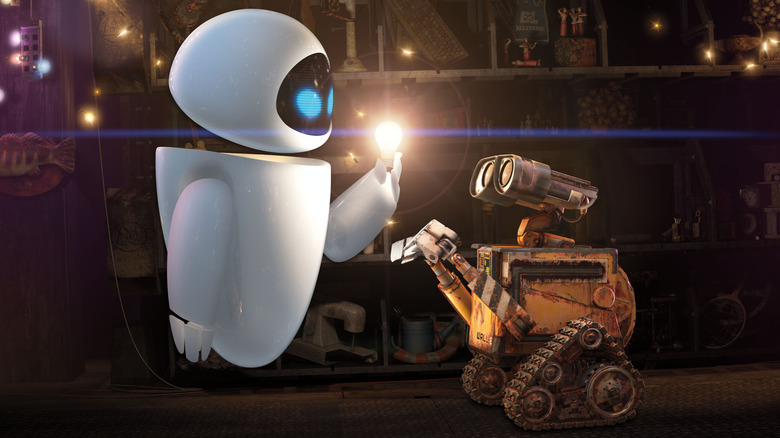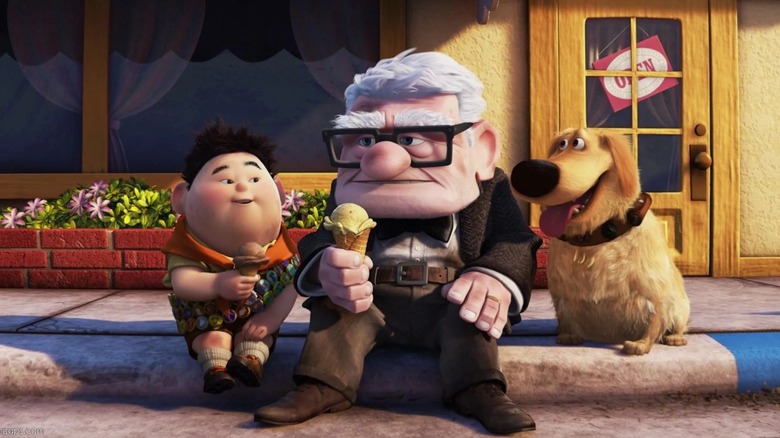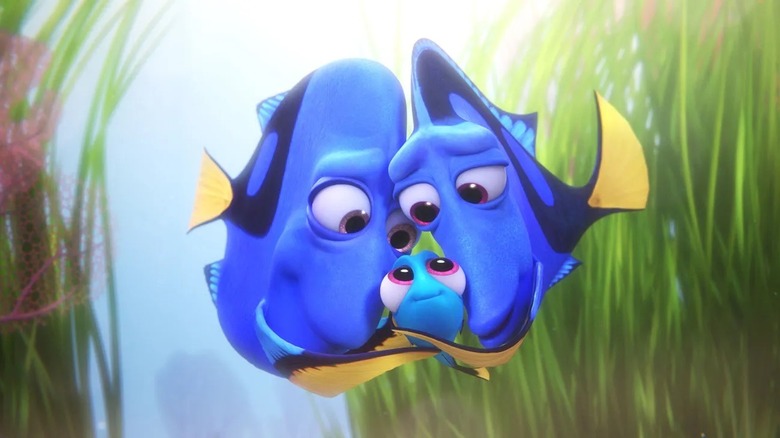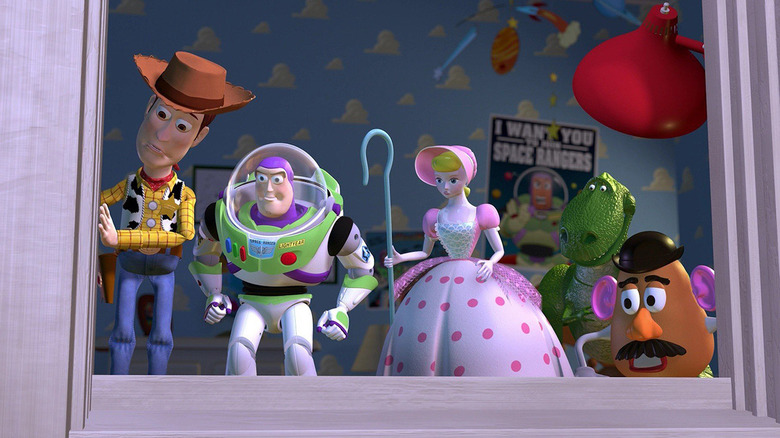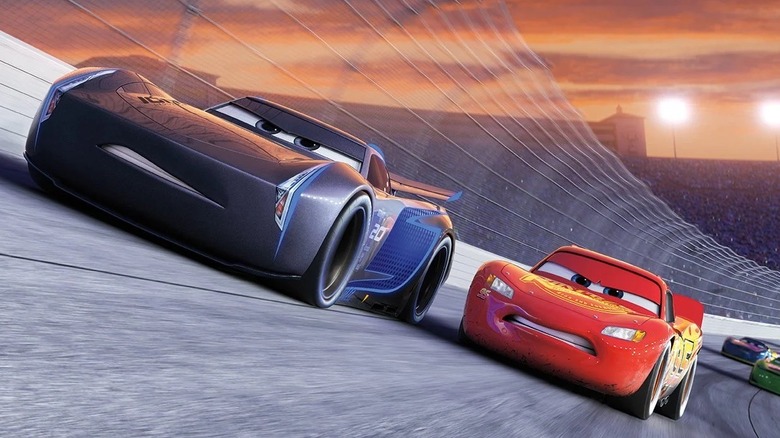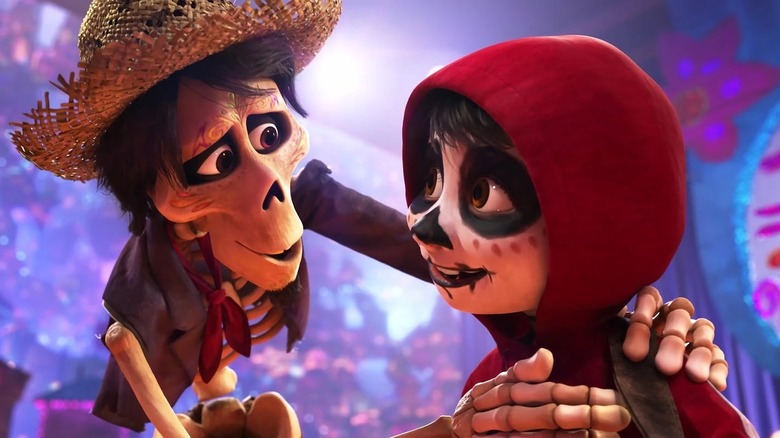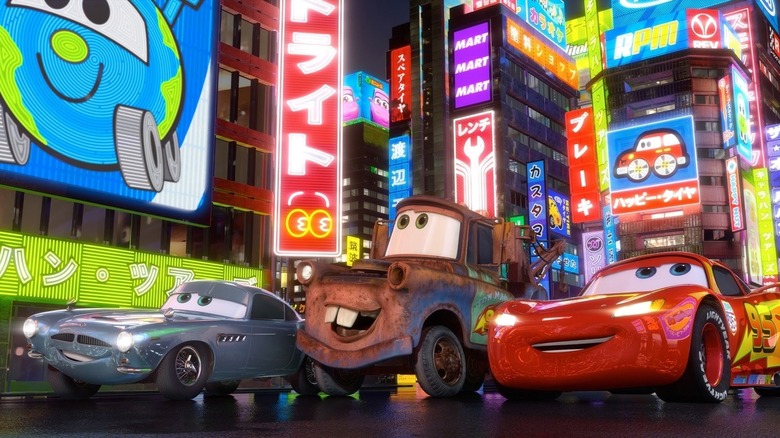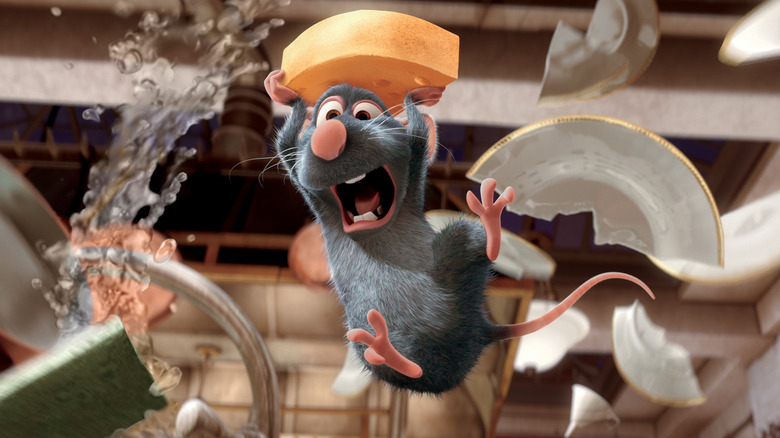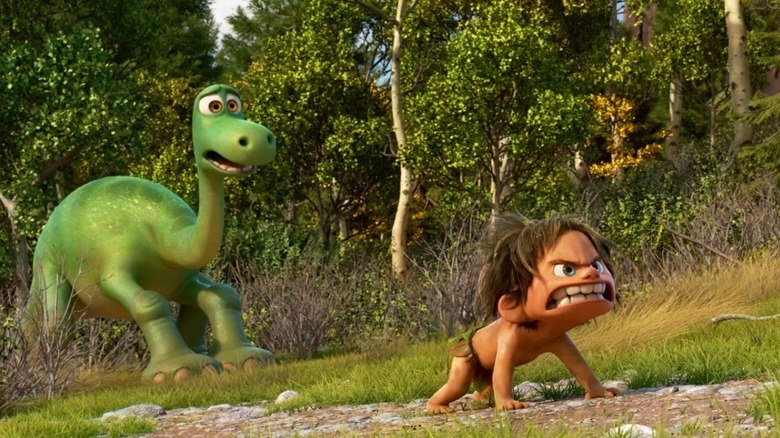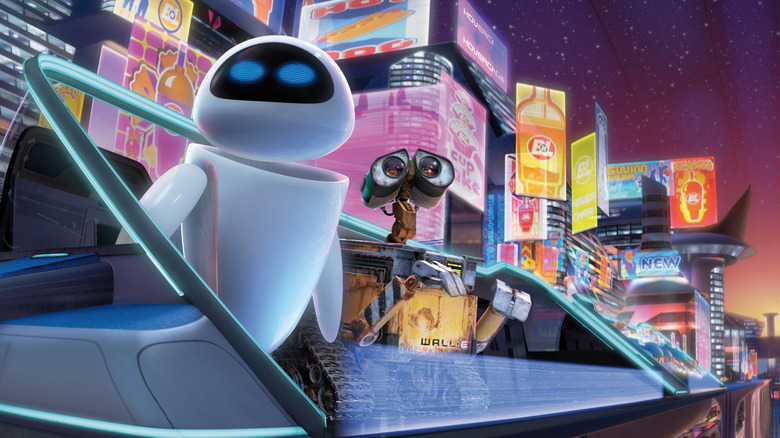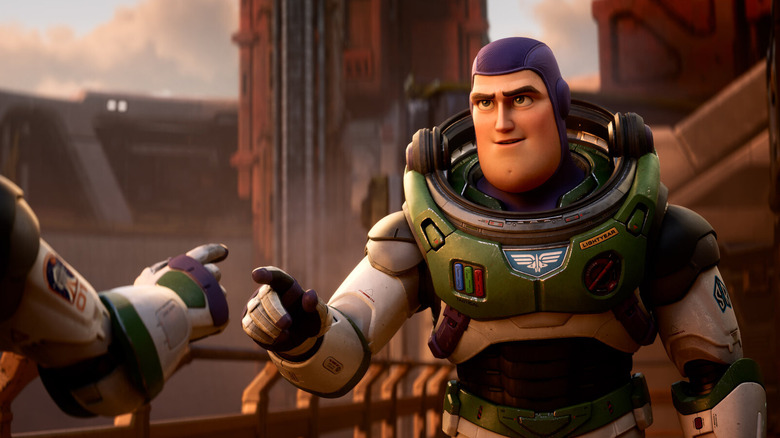The 5 Best And 5 Worst Pixar Movies, According To Letterboxd
In November 1995, the world of feature-length American animation was forever changed with the release of Pixar Animation Studios' "Toy Story." With the birth of CG-animated movies came a label that would soon be known for consistently delivering quality films. In the decades that followed, Pixar's reputation and critical track record have seen plenty of ups and downs. However, modern entries like "Soul" and "Turning Red" make it clear that this studio is still plenty capable of crafting movies that knock people's socks off, while its acclaimed classics are still dazzling audiences decades after their respective releases.
To examine the company's creative peaks and valleys, look no further than the highest and lowest-rated Pixar movies on Letterboxd. Users are quite open and detailed about which Pixar motion pictures they enjoy or detest, allowing the nuances of the studio's output to come bubbling to the surface. Exploring the platform's five best and worst rated Pixar films, it's striking to see the wildly varying virtues underscoring the highest-rated entries, as well as the frustrating shortcomings defining the lesser titles. While they may share similarly charming characters, groundbreaking animation, and great original songs, the best Pixar movies aren't defined by one common trait and likewise for the company's weakest works.
While this ranking reflects that Pixar, 30 years after "Toy Story," has far from an unblemished track record, it also demonstrates the gigantic creative risks that have paid off exquisitely for this game-changing studio.
Best: Up
2009's "Up" has become famous for its opening montage sequence chronicling the married exploits of Carl and Ellie. It's a tremendous feat of cinematic storytelling in how much it conveys with no dialogue and Michael Giacchino's powerful accompanying score. However, the only downside to this tour de force set piece is that it can sometimes overshadow how great the rest of "Up" is. Contrary to what some on the internet might say, the rest of "Up" isn't a severe downgrade from its emotionally rich first section. As its 4.1 Letterboxd rating can testify, there's project is jam-packed with amazing material.
Director Pete Docter deftly moves between quiet ruminations on defining a meaningful life, wackier impulses involving Dug the Dog, and bursts of dark comedy centered on Carl's elderly, cantankerous personality. A weaker film would collapse under such disparate tonal impulses, however, "Up," meanwhile," glides gracefully across its varying atmospheric inclinations. The movie also boasts soaring visual sensibilities, making everything from South American jungles to houses tethered to balloons look glorious on the big screen. Even the character designs, exemplified by the contrasting body shapes of square Carl and circular Russell, are uniquely magnificent.
Then there are the later pathos-heavy "Up" sequences equally as powerful as that "Married Life" montage. Carl inspecting Ellie's "Adventure Is Out There" scrapbook, for instance, is a towering feat of poignancy. If you think the film's charms are only contained in its earliest scenes, think again.
Worst: Finding Dory
As of this writing, "Finding Dory" has a 3.3 average score on Letterboxd. That perfectly respectable grade makes this the fifth-lowest rated Pixar feature film on the site, a testament to the generally positive reception greeting Pixar movies on the platform. Returning to "Finding Nemo's" world for a Dory-centric journey certainly inspired some Letterboxd enthusiasts, many of whom took notice of "Finding Dory's" new aquatic supporting cast. Rather than just running Bruce the Shark into the ground, the Andrew Stanton-directed follow up brought all kinds of new beluga whales, octopi, and seals into the mix.
Still, detractors of "Finding Dory" griped that the sequel leaned too heavily on"Finding Nemo's" audience goodwill, despite possessing only a fraction of its predecessor's emotional power. Going from the saga of a strained father and son to Dory's mystery-driven hunt for her parents was a tremendous narrative downgrade for many. Others found that Dory, much like "Cars 2" lead Mater, was a supporting character that didn't work as a protagonist. Additional complaints centered on an overly busy third-act and an excess of toyetic characters.
As a whole, Letterboxd users consider "Finding Dory" an amiable time, albeit a significant step down from the original. While perhaps not a glowing recommendation by any stretch, it's certainly better than your typical animated family sequel.
Best: Toy Story
With "Toy Story," the wizards at Pixar Animation Studios were making all kinds of history. This wasn't just their first feature film, it was also the first time in history CG animation was used for an entire 90-minute motion picture. Just pulling off something okay under these circumstances would've been laudable. Instead, the inaugural "Toy Story" adventure was a masterpiece that still resonates, as proven by its 4.1 Letterboxd score. Its ramshackle animation style hasn't aged well (especially when it comes to the human characters or a villainous dog), but otherwise, "Toy Story" remains an absorbing classic.
Among the many attributes making the feature a winner for Letterboxd users is its incredibly thoughtful and human story. Woody, Buzz, and their friends may be piggy banks and Hasbro entities, but their grounded emotions make them all the more real. "Toy Story's" script beautifully carves out the rich humanity from plastic playthings, which makes unforgettable third-act sequences like Buzz and Woody "flying" together so impactful. It's also a wickedly funny movie thanks to the barrage of lively voice-over performances from legends like Jim Varney, Wallace Shawn, and Don Rickles. Each lends engaging life to these endearing figures, further ensuring "Toy Story's" world remains irresistibly engrossing.
As its high Letterboxd standing makes clear, "Toy Story" is so grand in its self-contained achievements in storytelling and pathos that its historic accomplishments are practically superfluous.
Worst: Cars 3
Even after "Cars 2" was lambasted by critics, the promise of further toy and theme park tie-ins beckoned Pixar back to Radiator Springs. In June 2017, "Cars 3" zoomed into multiplexes as (to date) the final theatrically-released "Cars" movie. With a current Letterboxd rating of 3.1, "Cars 3" inspired many Letterboxd users to quote Mandy Patinkin on "The Simpsons" in saying "Yes, that's not too bad." Shifting the focus back onto Lightning McQueen and a more emotional racing story certainly helped the franchise get its bearings back after "Cars 2" took a detour into espionage nonsense.
Still, even if it wasn't a disaster, "Cars 3" still largely got a shrug from Letterboxd denizens. There just wasn't much going on in this title that inspired Letterboxd passion in any way, shape, or form. Director Brian Fee played the movie so safe (likely to not either rock the boat after the divisive "Cars 2" or alienate potential toy licensers) that everything from its animation style to its narrative structure to its voice performances just registered as forgettable to many. Adhering so strongly to typical underdog sports movie clichés further drained personality from the proceedings.
Still, for die-hard fans of this universe, "Cars 3" provided poignant closure for Lightning's journey and introduced plenty of striking new automobiles. For everyone else, the production was a painless viewing experience that was at least largely devoid of grating Mater antics.
Best: Coco
Eight of the nine highest-rated Pixar films on Letterboxd were released before 2011. While this phenomenon partially reflects the nostalgia certain users have for their childhood favorites, it also illustrates the studio's artistry before becoming consumed by near-annual sequels. One striking exception to this trend, though, is the third-highest rated Pixar movie on Letterboxd, "Coco," with a 4.1 rating. The Lee Unkrich directorial effort (co-directed and written by Adrian Molina) is the most recent entry on the list as of this writing, releasing in November 2017.
It's easy to see why "Coco" is so beloved by the Letterboxd community and film fans in general. This venture, which sees a boy traveling to the Land of the Dead, is rich with spectacular visuals, particularly in the skeleton realm. Vivid colors abound here that truly lend grandiose spectacle to a domain exclusively populated by the deceased, a testament to its accuracy to Mexican traditions and culture. It also nails sentimental moments that would've otherwise been cheap tugs at the heartstrings in inferior movies. While other modern animated family films, including those from Pixar, scramble to make every scene as hyperactive and towering as possible, "Coco's" finale opts to focus on a young boy singing a song to his grandmother.
The intimate scope accomplished as a result works beautifully and will get tears out of even the most cynical viewers. No wonder "Coco" is considered a modern accomplishment and one of Pixar's biggest movies to date.
Worst: Cars 2
After 15 consecutive years of non-stop acclaim, 2011's "Cars 2" forever upended the critical track record of Pixar Animation Studios by garnering incredibly negative reviews. Its 3.0 Letterboxd rating makes it apparent its reputation hasn't improved over the years. While past Pixar movies went in unexpected directions with their intriguing premises, "Cars 2" was an incredibly predictable exercise full of merchandising opportunities and bathroom humor.
Even the supposedly "radical" idea of shifting the "Cars" franchise into the mode of a spy movie pastiche was derivative of other family features such as "Spy Kids" and "Agent Cody Banks." Even Pixar's own "The Incredibles" took tons of cues from James Bond movies, the key inspiration for "Cars 2" aesthetics. That trait alone gave the entire production its stale feeling. The fact that "Cars 2" also expected audiences to lap up endless noisy Larry the Cable Guy antics, thanks to Mater getting upgraded to the role of protagonist, was just another misjudged move in this boondoggle. Its shrug-worthy set and character design choices were also underwhelming.
For toy manufacturers across the globe, "Cars 2" was a dream come true. But for everyone else, this was a painful exercise that seemed totally incongruous from the creative track record of the studio behind "WALL-E" and the "Toy Story" saga.
Best: Ratatouille
There's a good reason "Ratatouille" refuses to vanish from the pop culture consciousness. The absolutely preposterous thesis — of a rat cooking for an elite restaurant in Paris — informs a divine experience rife with inspired filmmaking choices, unforgettable physical comedy, and thoughtful ruminations of how artistry can come from anywhere. Letterboxd users have kept the "Ratatouille" flame alive with an outpouring of euphoric reviews, resulting in a 4.2 rating average. Such responses have ensured "Ratatouille's" artistic virtues, and not just its memes, persist in the minds of viewers.
Key among them is the glorious animation. Rarely have rats been as cute as they are in "Ratatouille," with their brightly colored fur and endearing designs. All the food, meanwhile, looks so good that it'll make anyone's tummy rumble with hunger. However, despite its appealing aesthetic and G-rating, the Brad Bird directorial effort never talks down to children. The feature's thoughtful dialogue and storytelling turns can captivate young and old audiences alike. This is perhaps best exemplified by the material connected to Anton Ego in the finale (including his lengthy, beautifully-written speech), which truly cements this project's captivating heart and soul.
You wouldn't want a real rat in your kitchen, granted. However, any discussion of great modern films is incomplete without the presence of "Ratatouille," an especially scrumptious entry into the canon of Pixar masterpieces.
Worst: The Good Dinosaur
"The Good Dinosaur" saw an incredibly cursed production that involved losing its initial director, an 18-month release delay, and overhauling its entire cast. Other Pixar works like "Ratatouille" and the first two "Toy Story" movies can attest to the reality of bleak behind-the-scenes drama not spelling doom for a film's final quality. For "Dinosaur," though, all that creative turmoil ended up being more interesting than the middling feature itself. Letterboxd users echoed the general public's sentiments by giving Peter Sohn's feature-length directorial debut a shrug-worthy 2.9 rating average.
Not everything about "The Good Dinosaur" was a total disaster, as seen by its beautifully realistic backgrounds and certain well-received supporting characters, such as a cowboy T-Rex voiced by Sam Elliot. Dialogue-free pathos-heavy scenes focusing on dinosaur Arlo and human boy Spot communicating were also lauded. However, generally, "The Good Dinosaur" just didn't have enough personality or life to win much respect from Letterboxd reviewers. The entire enterprise had a paint-by-numbers ambiance, informed by playing things buttoned up and predictable.
The creative zest of "The Incredibles" or the exciting supporting cast of "Finding Nemo" were completely absent from this prehistoric outing, rather resembling past animated dinosaur fare like "The Land Before Time" and "Dinosaur." In the end, "The Good Dinosaur's" unexceptional quality means its only real legacy is the tortured journey it took getting to the big screen.
Best: WALL-E
"Out there!" kicks off "WALL-E" with one of the greatest movie opening sequences ever created. Juxtaposing the opening lines of the "Hello Dolly!" song "Put On Your Sunday Clothes" with the vastness of outer space creates ingenious dissonance while simultaneously reflecting the cosmo's endless possibilities. Right from the start, writer director Andrew Stanton (who penned the script with Jim Reardon) demonstrates bold creative inclinations that serve this romantic robot yarn so well.
"WALL-E" keeps making inspired choices that pay off in spades, including refusing to expand the vocabulary of mechanical beings WALL-E and EVE beyond their names or occasional other phrases. This sparse vocabulary gives greater emphasis and personality to the actions of our protagonists. Leaning on largely dialogue-free characters also lets Thomas Newman's score excel, particularly in sequences like WALL-E and Eve "dancing" outside the gigantic Axiom spaceship. Who needs words when you have lovesick WALL-E using a fire extinguisher to move around in space?
There's no end to the glorious artistry and stirring emotional depth in "WALL-E." Its status as a masterpiece has only grown in the years since, with its 4.2 score on Letterboxd making "WALL-E" the highest-rated Pixar picture on the platform.
Worst: Lightyear
Years after its release, 2022's "Lightyear" is something tantamount to a fever dream. Just trying to explain the conceit of this enterprise — it's the in-universe fictional film that spawned the Buzz Lightyear toy — makes one sound like they've lost their mind. Granted, Pixar has turned even wackier concepts into all-time masterpieces. But in this case, the bizarre starting premise didn't produce a gem. Instead, "Lightyear" upset fans with a standard action movie that failed to either subvert the expectations of older viewers or deliver standalone fun for a new generation.
Letterboxd users made their disdain loud and clear by christening "Lightyear" with a lowly 2.8 average, the lowest-of any Pixar feature to date. Among its complaints was that the film, supposedly representing a mid-90s summer blockbuster, was a dreary affair that failed to capture the zippier, more tonally nuanced energy of auteurs from the era like Roland Emmerich. On top of failing to stay in line with the intended tone, it wasn't entertaining to watch on its own terms. An overly convoluted narrative (hinging entirely on tremendous time-jumps) and weird character design choices were also among recurring Letterboxd critiques.
"Lightyear" has its share of defenders as well as other users who found it perfectly serviceable as a kid-friendly sci-fi adventure yarn. For most Letterboxd denizens, though, "Lightyear" was as inexplicable a creation as it was a tremendous step down from the quality of the "Toy Story" movies.
